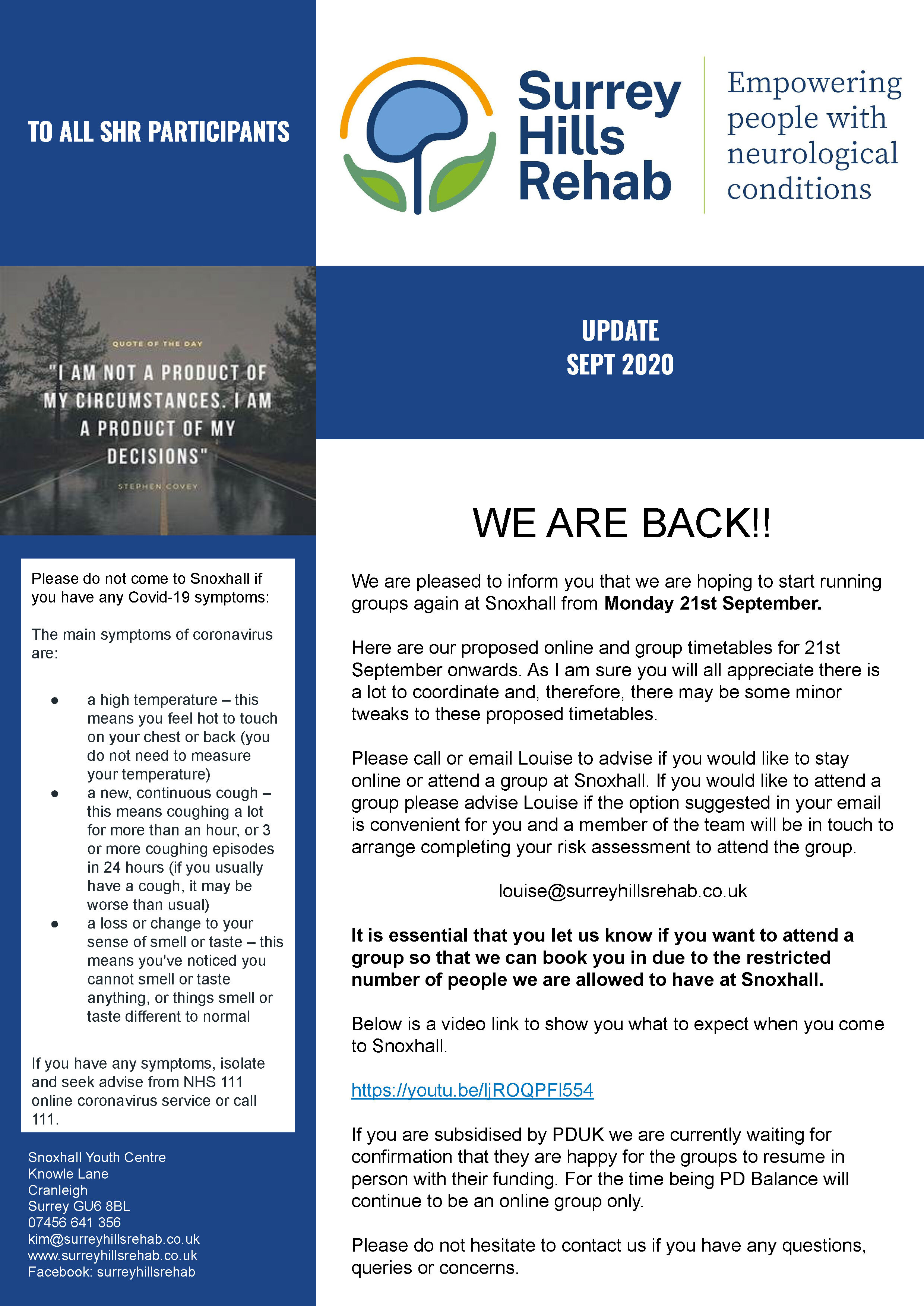See our latest newsletter
See our latest Newsletter
Have you experienced a Stroke, brain injury or spinal cord injury in 2020?
Still Experiencing COVID-19 symptoms?
See our latest update
Covid-19
Due to Covid-19 we are now running exercise groups, 1:1’s and support groups online. Please click the link below to view our full timetable or contact us for more information.
https://docs.google.com/presentation/d/1nUssEfApqtxODA_4urAtthpkeTX9ux7ciqnACtilk5o/edit?usp=sharing
During your isolation, should you need any support or help, you can get more information here:
Or you can call the Community Helpline number: 0300 200 1008 (Monday to Friday 8am-6pm, Saturday and Sunday 10am-2pm)
Stay safe!
Surrey Hills Rehab Team
Surrey Hills Rehab Exercise Groups
We will not be running groups during the following dates:
Easter holidays: Monday 6th April - Friday 17th April 2020 - groups will resume on Saturday 18th April 2020
Summer holidays: Monday 24th August - Friday 4th September 2020 - groups will resume on Saturday 5th September 2020
Christmas holidays Monday 21st December 2020 - Saturday 2nd January 2021 - groups will resume on Monday 4th January 2021
Please speak to Naomi directly regarding the dates that NeuroPilates runs.
1:1 sessions and home visits will continue throughout these holiday periods for those in most need.
WE ARE MOVING!
As of March 2020 we are moving into the heart of the Cranleigh community to Snoxhall Youth Centre. Our team of highly skilled Physiotherapists and Physiotherapy Assistants will be welcoming patients - existing and new – to our new home. This exciting move will give us additional space to grow further and to be able to run our 15 specialist exercise groups per week as well as continue to support 1:1 patients, peer support groups and information workshops. We will also be able to increase our range of interesting and creative exercises.
We know that supporting each other is invaluable when dealing with neurological conditions such as Parkinson’s, Stroke and MS and now that we are located in the middle of Cranleigh there are lots of lovely cafes and restaurants to venture to after a group.
Snoxhall Youth Centre has extensive parking and is fully accessible with level access throughout.
Please join us for an open afternoon on Saturday 18th April 2020 from 1.30-3.30pm to meet the team and see what we do.
We’d like to thank all our amazing patients for their continued support during this transition and we very much look forward to being a bigger part of the wonderful Cranleigh community.
COMBATING MS ONE EXERCISE AT A TIME
After I was diagnosed with Multiple Sclerosis, the wealth of information and suggestions from medical professionals as well as well-meaning family members and friends on how to stay healthy was somewhat overwhelming. Apart from all the different diets and supplements, regular exercise has proven again and again to be highly beneficial for people with MS as it can help with muscle weakness, pain, balance issues, fatigue, mood and many other symptoms.
Simply signing up for classes at the local gym did not seem ideal though as others in the class seemed fitter and healthier, something that can become discouraging quite quickly when you cannot keep up. Furthermore, despite being engaging and supportive, class instructors tend to lack knowledge of the physical challenges that come with MS. And with support groups often only offering seated exercises, there seems to be a lack of options for people with a low disability level.
Then, earlier last year, I read about Surrey Hills Rehab in the MS Society newsletter. This centre offers exercise classes run by certified physiotherapists specifically for those with various neurological illnesses. After an introductory session with Kim Wilson, who founded Surrey Hills Rehab in 2018, I started attending the neurophysio-led MS class in September 2019. The class offers a mixture of cardio, balance, relaxation and muscle-strengthening exercises.
The fact that it is led by a physiotherapist with a background in neurology makes me feel like I am in safe hands and that I can ask for help and support at any point. Since I am currently working full-time, I also find it very convenient that it takes place outside of regular working hours; this is not always the case for classes aimed at people with specific health conditions – support groups as well as exercise classes – as they are often held in the middle of the day.
MS is often referred to as a ‘snowflake disease’ as it has so many different symptoms and everyone experiences them at a different level. However, we often face many of the same challenges – especially when it comes to dealing with doctors as well as family and friends – so it can be quite motivating and uplifting to be able to share your journey with other people who are in the same boat.
Cranleigh FND Peer Support group
Dr Mike Dilley, Consultant NeuroPsychiatrist helped launch the first ever meeting of the Cranleigh FND Peer Support group. The meeting was organised jointly by Surrey Hills Rehab and FND Hope UK, a charitable organisation promoting awareness and support for individuals and carers affected by Functional Neurological Disorder.
It was a great success and for many it was the first time they had ever met someone else with FND. The group comprised a mixture of those diagnosed with FND and professionals who wanted to learn more about this little known condition.
TRANSVERSE MYELITIS GROUP MEET AT SURREY HILLS REHAB
The 9th June is Transverse Myelitis Awareness day, and this year it was celebrated at Surrey Hills Rehab in Smithbrook Kilns which is run by Kim Wilson, with tea, talk and lots of cake.
TM is a rare disease of the central nervous system involving inflammation of the spinal cord. This results in messages from the brain to the body being blocked, causing sensory and motor impairment. Sufferers can experience numbness, tingling, pain, paralysis, spasticity, weakness, fatigue and problems with bowel, bladder and sexual dysfunction.
Exercise with Parkinson’s: an addition to medication, with no bad side effects.
There is a growing body of evidence that appropriate exercise can slow the rate of progression of Parkinson’s – and who wouldn’t want to do that? Exercise is like a new medicine but without the negative side effects of a drug. The only side effects are possible stiffness at first in areas not normally stiff, then a feeling of satisfaction and achievement. Not bad!







